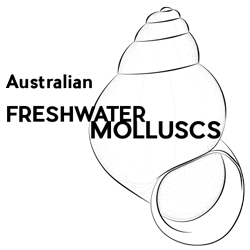
This species belongs to the Austropyrgus cooma group, whose members are characterised by generally pupiform to conical, small to medium-sized shells, where the last whorl and base are evenly convex.
This is one of several species of Austropyrgus found in the southern half of New South Wales. They are all very similar, being separated on small differences in size and shape of the shells and in anatomical details. They have elongate-conic shells with adults having a slightly thickened aperture and the operculum bears several pegs. This species is found in the vicinity of Jindabyne.
Austropyrgus monaroensis Clark, Miller & Ponder 2003
Class Gastropoda
Infraclass Caenogastropoda
Order Littorinida
Suborder Rissoidina
Superfamily Truncatelloidea
Family Tateidae
Genus Austropyrgus Cotton, 1942
Original name: Austropyrgus monaroensis Clark, Miller & Ponder, 2003. In Clark, S. A., Miller, A. C. & Ponder, W. F. (2003). Revision of the snail genus Austropyrgus (Gastropoda: Hydrobiidae): A morphostatic radiation of freshwater gastropods in southeastern Australia. Records of the Australian Museum Supplement 28: 1–109.
Type locality: Wambrook Creek, west of Cooma, Snowy Mountains Highway, Kosciusko National Park, New South Wales.
In small streams on water weeds, hard substrata (rocks etc.) and crawling on litter and sediment. Can be locally abundant. Assumed to feed by scraping bacteria and microalgae. Lay solitary capsules containing a single egg. Direct development.
Known from a few small streams around Jindabyne to the west of Cooma, New South Wales.
Most species of Austropyrgus are geographically isolated and have restricted ranges, and this one is no exception.
Clark, S. A., Miller, A. C. & Ponder, W. F. (2003). Revision of the snail genus Austropyrgus (Gastropoda: Hydrobiidae): a morphostatic radiation of freshwater gastropods in southeastern Australia. Records of the Australian Museum 28: 1–109.